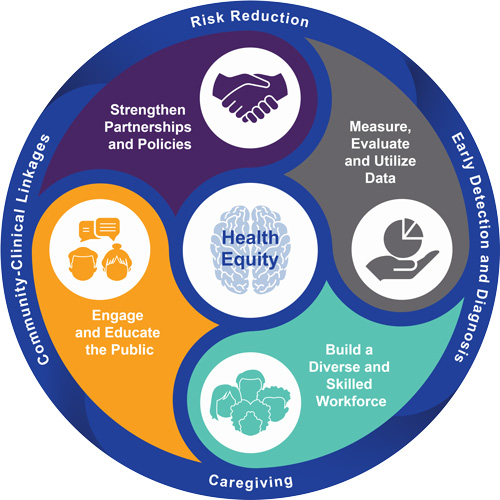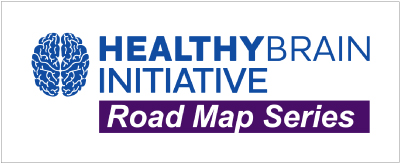Healthy Brain Initiative (HBI) Road Map
Throughout history, public health has had an overwhelmingly positive effect on population wellness. As a result, people are living longer in communities all over the country. But as the size of the U.S. population age 65 and older continues to grow, so too will the number and proportion of Americans living with cognitive decline and dementia. Just as with other chronic conditions, the best way to reduce risk, detect problems early and improve safety and quality of care is to act now.
The Healthy Brain Initiative (HBI) Road Map, updated for 2023-2027, is a framework designed to help public health professionals lead with urgency and act for impact in their communities to improve brain health across the life course and support caregivers.
- HBI Road Map, 2023-2027 (PDF).
- Executive Summary (PDF).
- What’s New (PDF).
- Implementation Guide (PDF).
Road Map to guide the public health response
 Download the HBI Road Map, 2023-2027
Download the HBI Road Map, 2023-2027
Experts have developed 24 actions for public health leaders to promote brain health, better care for people living with cognitive impairment and increase support for caregivers.
The overarching vision of the Healthy Brain Initiative (HBI) is that everyone deserves a life with the healthiest brain possible. Since 2005, the HBI has been working to implement public health strategies that promote brain health, address dementia, and support individuals living with dementia and their caregivers. Public health systems play a crucial role in impacting brain health. These systems include various public, private, and voluntary entities that deliver essential public health services within a jurisdiction. The Healthy Brain Initiative: State and Local Road Map for Public Health, 2023-2027 expands on previous progress, promotes equity by integrating brain health and caregiving into state and local public health practices, and addresses the social factors that impact brain health throughout a person's life.
Get started with the 2023-2027 HBI Road Map
To aid the implementation of the HBI Road Map, several ready-made tools and resources can help state and local public health leaders prioritize actions and tailor their response to best fit the needs of their community.
- What's New (PDF): Explore the changes in the HBI Road Map, including an increased focus on health equity and more emphasis on the importance of partnerships, among other changes to help promote brain health.
- Implementation Guide (PDF): This guide expands on the eight planning questions of the HBI Road Map to help health departments implement actions.
- Evaluation Tool (PDF): This tool offers suggested measures and metrics for state, local and tribal health departments to track, evaluate and measure implementation of the HBI Road Map. Email publichealth@alz.org to request a pre-populated Excel document that can be used for data collection.
- Video overview: Watch this recorded webinar with experts from the Alzheimer's Association and CDC to learn what's new in the 2023-2027 Road Map.
Use topic-specific issue maps to enact change in your community
Topic-specific issue maps explore public health issues that address Alzheimer's and other dementias. Each issue map explains the need for action, suggests related HBI Road Map actions and highlights members of the HBI Collaborative to provide additional guidance. View issue maps covering key areas of focus:
- Ensuring Early Detection and Diagnosis (PDF): Act proactively by recognizing the population health benefits that early detection and diagnosis of dementia can bring. Learn more: Early Detection and Diagnosis.
- Reducing Risk of Cognitive Impairment (PDF): Foster healthier communities by addressing the risk of cognitive decline through public health. Learn more: Risk Reduction.
- Enhancing Community-Clinical Linkages (PDF): Improve connections between health care providers and community-based organizations to improve outcomes for people living with dementia and their caregivers.
- Advancing Health Equity (PDF): Learn how to center and operationalize health equity in the public health approach to dementia. Learn more: Health Equity.
- Supporting Caregivers (PDF): Establish a public health approach that effectively supports and meets the needs of dementia caregivers. Learn more: Caregiver Support.
Resources and data for health departments
Health departments are emerging as leaders and foundational partners in addressing the growing impact of Alzheimer's, cognitive decline, and dementia caregiving. They are using innovative public health approaches to prioritize healthy aging, older adults and dementia across all communities. An Implementation Guide (PDF), Evaluation Tool (PDF) and several topic-specific issue maps are available as part of the 2023-2027 HBI Road Map.
Find public health information for every state
Select a state to see the impact of Alzheimer’s and how local governments and organizations are addressing the crisis.
Find public health resources by topic and audience
Get public health data, curriculum and listings of intervention models:
- BRFSS and other data resources: Find data on Alzheimer's, dementia and public health from BRFSS and other sources.
- Public health curriculum: Use a curriculum designed for schools and programs of public health and related disciplines.
- Resource database: Search for public health resources.
- Examples of public health in action: See successful examples and program models of public health interventions that address Alzheimer's and dementia.
Conceptual framework

The framework of the HBI Road Map consists of four domains built from the Essential Public Health Services:
- Strengthen partnerships and policies: Public health strengthens, supports and mobilizes community partnerships to improve brain health. It also creates, champions and implements supportive policies and plans.
- Measure, evaluate and utilize data: Public health monitors health status to identify and solve community health problems and evaluates effectiveness, accessibility and quality of personal and population-based health services. Findings are translated into data-informed programs and policies to improve brain health across the life course.
- Build a diverse and skilled workforce: Public health trains and prepares the public health and health care workforce to educate their constituents and provide the best care to people at risk for or living with dementia while supporting caregivers.
- Engage and educate the public: Public health engages with diverse communities to understand how messages are best delivered and what information to convey to specific populations. Public health communicates effectively to educate people about factors that influence brain health and ways to maintain or improve their cognitive health and quality of life.
The framework is centered on the principles of health equity and surrounded by the areas of practice across the life course — risk reduction, early detection and diagnosis, caregiving, and community-clinical linkages. The framework depicts the interconnectedness of these elements showing the essential nature of each in a successful strategy to improve brain health.
History of the Healthy Brain Initiative Road Map Series
 In 2005, Congress first appropriated funds for the Centers for Disease Control and Prevention (CDC) to focus on brain health and dementia for the first time. This action led to the HBI and the longstanding collaboration between the Alzheimer’s Association and CDC to advance understanding of and support for cognitive decline as a central part of public health practice. Since that time, HBI partners have worked together to implement public health strategies that promote brain health, address dementia and help better support caregivers.
In 2005, Congress first appropriated funds for the Centers for Disease Control and Prevention (CDC) to focus on brain health and dementia for the first time. This action led to the HBI and the longstanding collaboration between the Alzheimer’s Association and CDC to advance understanding of and support for cognitive decline as a central part of public health practice. Since that time, HBI partners have worked together to implement public health strategies that promote brain health, address dementia and help better support caregivers.
The Healthy Brain Initiative Road Map Series guides this effort. In addition to the 2023-2027 HBI Road Map, the series includes:
- Road Map for Indian Country, 2019 — The 2019 HBI Road Map for Indian Country is the first public health guide focused on dementia in American Indian and Alaska Native communities. This Road Map offers eight broad public health strategies designed to support discussion about dementia and caregiving within tribal communities and to encourage a public health approach as part of a larger holistic response.
And past editions:
- National Public Health Road Map to Maintaining Cognitive Health, 2007 (PDF) — The first HBI Road Map served as the pioneering framework for addressing dementia as a public health issue. Its 44 actions to tackle dementia at a national level established a foundation for broader engagement within the public health community.
- The Public Health Road Map for State and National Partnerships, 2013-2018 (PDF) — The second HBI Road Map expanded the role that state and local public health departments and partners could play by offering 35 actions to promote cognitive functioning, address cognitive impairment and dementia, and help meet the needs of caregivers.
- State and Local Public Health Partnerships to Address Dementia, 2018-2023 (PDF) — The third HBI Road Map empowered state and local public health departments and partners to act swiftly and strategically. With 25 actions aligned with Essential Public Health Services, it facilitated seamless integration of Alzheimer's initiatives into existing public health efforts, fostering policy, system, and environmental changes.
